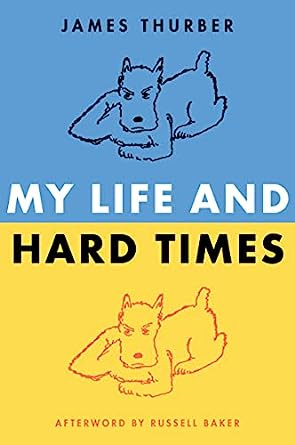“By this time my mother, still shouting, pursued by Herman, still shouting, was trying to open the door to the attic, in order to go up and get my father’s body out of the wreckage.”
Serious writers aspire to a kind of super onomatopoeia. Ocean descriptions that seem to surge and crash immensely. Fox descriptions that seem to flit weightlessly in and out of view.
Joseph Conrad manages it, with his sinuous description of smoke working its way through a burning ship:
“The smoke kept coming out through imperceptible crevices; it forced itself through bulkheads and covers; it oozed here and there and everywhere in slender threads, in an invisible film, in an incomprehensible manner.”
And Joyce does too, with his famously light and lovely snow:
“…he heard the snow falling faintly through the universe and faintly falling…”
Unserious writers, on the other hand, see the comedy in all this ostentatious virtuosity. And there has never been a better unserious writer — one more inclined to pick up literary trophies and turn them into party hats — than James Thurber.
Thurber was, of course, an Ohio-bred humorist who, throughout the middle of the last century, enjoyed a house seat at The New Yorker. Every reader has a handful of writers whose voices feel to them mysteriously familiar and instantly, cellularly comprehensible, whose names together constitute a kind of literary home address. Thurber Lane is one of my cross-streets. His casually elegant prose — there’s something of Vonnegut in his rumpled humor, something of William Maxwell in his Midwestern serenity — works on me like the feel of freshly laundered bedsheets.
Watch how, in his great short essay “The Night the Bed Fell,” he turns the ideal of super-onomatopoeia on its head.
The essay tells the story of a chaotic night in Thurber’s crowded childhood home. Thurber’s father, desperate for some peace and quiet, is sleeping in the attic — despite Thurber’s mother’s conviction that the bed up there is likely to collapse on him. Brothers and hypochondriacal cousins and bull terriers are stashed in rooms throughout the house.
And in the middle of the night, Thurber himself falls out of bed. A heavy sleeper, he doesn’t wake up immediately. But his mother hears the bang and becomes convinced that the worst has happened: the attic bed has collapsed on her dear husband.
The house becomes a poorly lit pinball machine — the mother racing around to save her husband; the brothers stumbling loudly after her; the father, upstairs, wondering what all the commotion’s about; Thurber coming dimly into consciousness beneath his bed.
“By this time my mother, still shouting, pursued by Herman, still shouting, was trying to open the door to the attic, in order to go up and get my father’s body out of the wreckage.”
I love so much about this sentence, but especially those courtly still shouting’s, which Thurber slips into the sentence like a maitre d’ sliding chairs — just in time — beneath distracted diners in a French restaurant. And that wonderfully grave word wreckage: a Kevlar vest buckled around what turns out to be a macaron.
This is prose that flaunts its lack of resemblance to its subject — has there ever been a sentence so unlike a house full of loudly panicking, half-asleep relatives? But with its calm refinement, its imperturbable half-smile, this sentence — like so much of Thurber’s writing — does something even better. It models the values — humor, acceptance, a refusal to lose one’s head — that make life bearable, even when all is uproar and unexpected thumps. Down a dark and fearsome hallway, Thurber carries a candle.




You had me at Vonnegut. I need to read some Thurber!
Ben, I have a freelance assignment that I think you’d be perfect for. Can you email me? Matthew.fuller@thedailybeast.com